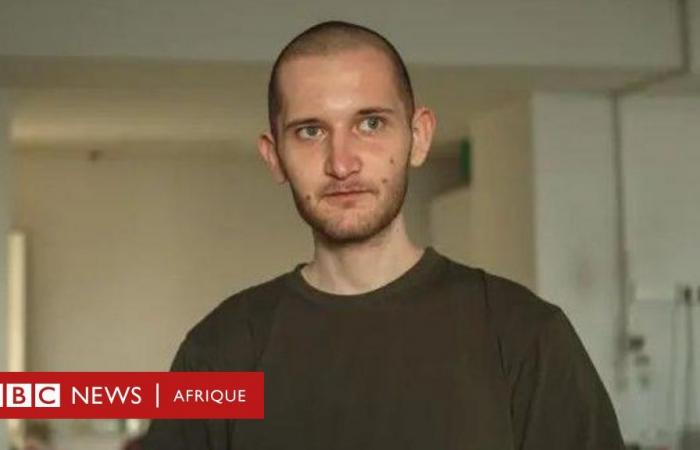
- Author, Zhanna Bezpyatchuk
- Role, BBC News Ukraine
- Reporting from Kiev
-
3 hours ago
“It was painful to find out how many people, how much time and effort it took to free me from Russian captivity,” Yury Gulchuk said.
The 22-year-old Marine was a prisoner of war for more than two years.
He spent 30 months, between April 2022 and September 2024, transferred from one Russian prison to another, often beaten and mistreated.
During almost a year of captivity, he did not speak, which allowed him to protect himself psychologically and physically.
He remained silent even after returning home. A video of his mother, Milana, hugging his skinny frame and stroking his face circulated online.
“We love you, we love you,” Milana repeated to make him talk.
He later explained that at the time he was unable to communicate.
The first thing his mother heard him say was, “Why are people so cruel to each other?” “Why are people so cruel to each other? Why is there so much suffering? »
Historic day
Yury enlisted in the marines just two weeks before the full-scale Russian invasion began on February 24, 2022. That day he was in Mariupol.
“We woke up and heard a crash. The ground floor windows were broken. We thought it was an explosion on the nearby front line.”
A few hours later, it became clear that the war had begun.
Photo credit, Getty Images
“The history books will write that it all began in Mariupol that day,” I thought. And I was in Mariupol, at that time,” Yury said. “But I had no idea what the future held for me.
Nearly two months later, he was captured by the Russian army.
“Clear sadism”
“How we were treated depended on who was on duty in the prison,” Yury recalls.
“Some guards beat all the prisoners. Others asked who was over 50, sick or injured, and they spared them. But some guards were clearly sadistic.”
In October, UN High Commissioner for Human Rights Volker Turk warned of “widespread and systematic” torture of Ukrainian prisoners of war by Russian forces.
His statement was based on the documented accounts of 174 Ukrainian prisoners of war, almost all of whom described constant experiences of torture during their captivity.
Prisoners were subjected to electric shocks, beatings, sexual assault, sleep deprivation and threats of further violence.
Photo credit, Getty Images
In August, Danielle Bell, head of the United Nations human rights monitoring mission in Ukraine, said that 95 percent of Ukrainian soldiers captured by Russia had been tortured.
On October 29, a report from the Independent International Commission of Inquiry on Ukraine was presented to the United Nations General Assembly, stating that Russian authorities had committed acts of torture as a crime against humanity.
In October, Ukrainian prosecutors opened an investigation into what they described as “the largest mass execution” of Ukrainian prisoners by Russian troops since the start of the full-scale invasion of Moscow, saying 16 men had been lined up and shot in a forest.
Russia has not commented on any of the UN reports or allegations of torture or killing of Ukrainian prisoners of war by its forces.
In June, Russian President Vladimir Putin announced that 6,465 Ukrainian soldiers were in captivity.
However, the Ukrainian NGO Media Initiative on Human Rights estimated that more than 10,000 Ukrainian soldiers could be held prisoner by Russian forces.
Ukraine claims to have succeeded in freeing at least 3,650 of its citizens, military and civilians.
''Psychological game''
Yury Gulchuk lost more than 20 kilograms during his captivity, but he remained determined to one day be free.
He dreamed of his parents, his childhood and made plans for the future. Most of the time he remained silent.
“I slipped into silence little by little. It’s not like I decided to stop talking one day…I kept quiet because it was necessary.”
When he was taken to be exchanged with Russian prisoners, he initially did not believe that he would soon be released.
For him, this is another “psychological game” of Russian soldiers, who pretend to take a prisoner to an exchange when in reality, they are only transferring him to another prison. There, prisoners are often beaten even harder.
That's why, on the day of his exchange, Yury was preparing not for the joy of seeing his parents again after two years, but for beatings, humiliation and pain.
He and other Ukrainian prisoners were taken through Russia's neighboring country Belarus, which also borders Ukraine. They were allowed to remove the blankets from their heads and given dry rations with chocolate, biscuits and crackers.
“It seemed surreal,” Yury recalls.
He kept thinking it was a prank and it was only after seeing his mother and other members of his family, who were waiting for him, smiling, that he started to believe it was real.
Adapt to life
At first, after he was reunited with his family, he couldn't speak.
“It wasn’t just about working the vocal cords. To start speaking, singing or shouting, I had to exercise a mental muscle that had weakened. We had to bring him back to life.”
It took Yury a few days to believe he was home and safe.
He says he wants to watch every hit movie released during his captivity, listen to the latest music and ride an electric scooter.
He also plans to resume his Chinese studies at kyiv State University, which he had interrupted shortly before the start of the war to join the army.
“I tell myself that the time I spent in captivity was not totally wasted,” he says. “It may be self-consolation, but I want to say that I learned something from this experience.
“I was lucky to survive. Not everyone was so lucky.





